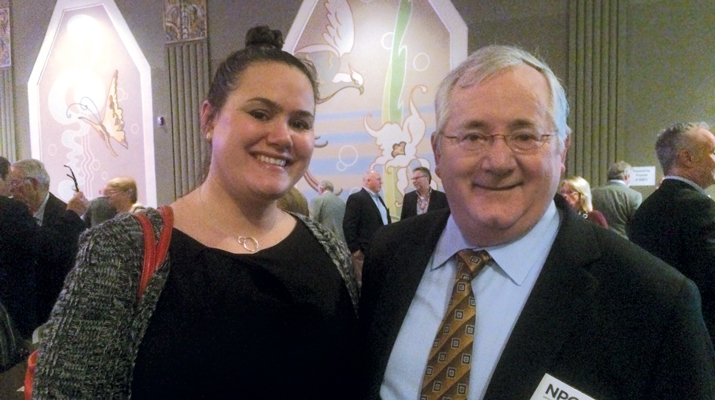September 11 crisis fallout continues
If you haven’t received a friendly visit from the feds lately, you likely will soon. The Federal Motor Carrier Safety Administration is making rounds of almost all the nation’s hazmat carriers “to increase the level of awareness of hazardous materials carriers to terrorist threats.”
Don’t worry – they’re not checking compliance or enforcing any rules. But they’ll suggest ways to guard yourself against becoming the victim or the ammunition for the next terrorist crime.
“All bulk propane haulers will be visited,” says FMCSA Senior Hazmat Specialist Bill Byrd. Field staff are visiting 500-1,000 haulers a day and have about 40,000 to cover, Byrd says.
“Nothing would be a better device than a tank of gasoline or a tanker full of propane. It would be one of the worst terrorist weapons around,” he says.
FMCSA is asking state governments to help in the effort. The visitors also hope haulers don’t mind sharing information with competitors. “If we have one carrier with a really good security program would they want to share their plan with others in their segment of the hazmat community?” Byrd says.
FMCSA’s policy is to call ahead and make appointments. “It’s not a surprise visit,” Byrd promises. FMCSA doesn’t even regulate shippers.
FMCSA has put together talking points as a starting point for conversations between government officials and carriers. It offers suggestions for checking employees’ backgrounds, controls, etc. and is available on its website (www.fmcsa.dot.gov/hazmatsecure.htm).
You want to carefully check job applicants who will haul or access propane. “If something seems out of place, look a little harder. I hate to profile a little bit but if somebody with an Middle Eastern accent comes in without proof of citizenship, look a little harder,” Byrd says.
If somebody who just got a license wants to haul propane, find out why. Be leery if a non-citizen shows a work visa that has expired or is about to expire. Ask why they want to work for you. “If their work visa expires next week, maybe their first trip will be one-way,” Byrd warns.
Know the number of your local Federal Bureau of Investigation office to call if you suspect or encounter a problem. The local office likely can respond much more quickly than the national 800 number.
The website does suggest some profiling. It says “if possible, identify those drivers whose names can be linked to one of the countries that have been identified that support terrorist activities…Ensure that detailed background checks have been performed on these individuals as required by the regulations.” The site refers to an “attached list identifying suspected terrorist countries.” But it supplies no list and an official says FMCSA put up the site somewhat hastily and hasn’t compiled a list.
The September 11 airliner bombings have slowed federal actions across the board, including the energy field.
The Occupational Safety & Health Administration put off its new plan to deal with ergonomics at the workplace. OSHA had planned to unveil its strategy in September but announced late in the month that it put it off till later in the fall because it and other Department of Labor offices have sent much of their staffs to aid in rescue and recovery efforts at the World Trade Center and Pentagon.
The uncertainty of air travel and the travel restrictions many companies have placed on their employees led RSPA to cancel its quarterly performance review meeting on “Better understanding of mechanical damage in pipelines” it had scheduled for Sept. 27 in Atlanta. RSPA hadn’t decided whether to reschedule the event. The Gas Research Institute, Batelle Memorial Institute and Southwest Research Institute are running the project.
RSPA also canceled two public meetings on its proposed Hazardous Materials Regulations concerning loading, unloading and storage. It abandoned the planned Sept. 14 meeting in Washington, D.C. in the wake of the terrorist attacks and won’t reschedule it. RSPA also canceled a scheduled Oct. 30 meeting in Diamond Bar, Calif.
RSPA didn’t cancel the meetings strictly because of the crashes. It seems the opportunity to voice input in person to the government didn’t attract much attention. More than seven weeks after RSPA publicly announced the hearings, only 10 people signed up to speak in Washington, and only four did for California, including two of the same people.
The public comment period remains open through November. RSPA will consider late comments, if possible.
In Brief
- LIHEAP: Who, how much
Households receiving energy assistance likely have kids running around. The U.S. Census Bureau’s Survey of Program Dynamics of families receiving federal subsidies found that while only 1 percent of married couples without children got energy benefits, 10.7 percent of households with children did.Only 3.2 percent of households overall received energy assistance in 1996.
The House Appropriations Subcommittee on Labor, Health & Human Services, and Education approved a 2002 spending bill that would provide $2 billion for LIHEAP, $300 million more than President Bush requested. The funding would include a $300 million emergency fund. The Senate Appropriations Committee proved even more generous, offering $2 billion plus the $300 million emergency fund. - Engleman confirmed
The Senate confirmed Ellen Engleman as administrator of the Research & Special Programs Administration.Engleman appointed James O’Steen as deputy associate administrator for the Office of Pipeline Safety. O’Steen had directed RSPA’s Office of Hazardous Materials Technology. The Senate also confirmed Joseph Clapp to head the Federal Motor Carrier Safety Administration. - RSPA funding
RSPA has funded 24 projects in 14 states to prevent damage to pipelines and other underground facilities. The $3.6 million in competitively awarded grants go to states to reduce damage, the major cause of which is excavation. Grantees
must respond to problems found in RSPA’s Common Ground report. Projects can include requiring excavators to check before they dig and creating a central databank of pipelines, telephone wires, etc. and using technology to locate
underground pipes.
The agency also recently awarded nearly $12.8 million through the Hazardous Materials Emergency Preparedness Grant Program governments to improve their response to hazmat transportation incidents. Grantees can train staff, improve planning and study potential problems. - Better paperwork
States evidently get confused about what info they have to provide about their use of Low Income Home Energy Assistance Program funds. The Administration for Children & Families is planning to simplify the instructions for the LIHEAP Carryover & Reallotment Report. ACF is required to collect these reports from states before it gives them funding for the next year.
















